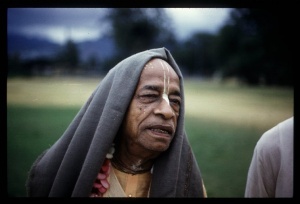SB 7.4.45: Difference between revisions
m (1 revision(s)) |
(Vanibot #0018 edit: make synonym terms in Sanskrit italic in SB - Vanisource) |
||
| Line 1: | Line 1: | ||
{{info | {{info | ||
|speaker=King | |speaker=King Yudhiṣṭhira | ||
|listener= | |listener=Nārada Muni | ||
}} | }} | ||
[[Category:Srimad-Bhagavatam - Canto 07 Chapter 04]] | |||
[[Category:Bhagavatam Verses Spoken by Yudhisthira Maharaja - Vanisource|070445]] | |||
<div style="float:left">'''[[Srimad-Bhagavatam]] - [[SB 7|Seventh Canto]] - [[SB 7.4: Hiranyakasipu Terrorizes the Universe|Chapter 4: Hiraṇyakaśipu Terrorizes the Universe]]'''</div> | |||
<div style="float:right">[[File:Go-previous.png|link=SB 7.4.44]] '''[[SB 7.4.44]] - [[SB 7.4.46]]''' [[File:Go-next.png|link=SB 7.4.46]]</div> | |||
{{RandomImage}} | |||
==== TEXT 45 ==== | ==== TEXT 45 ==== | ||
<div | <div class="verse"> | ||
putrān vipratikūlān svān | :putrān vipratikūlān svān | ||
pitaraḥ putra-vatsalāḥ | :pitaraḥ putra-vatsalāḥ | ||
upālabhante śikṣārthaṁ | :upālabhante śikṣārthaṁ | ||
naivāgham aparo yathā | :naivāgham aparo yathā | ||
</div> | </div> | ||
| Line 17: | Line 22: | ||
==== SYNONYMS ==== | ==== SYNONYMS ==== | ||
<div | <div class="synonyms"> | ||
''putrān''—sons; ''vipratikūlān''—who act against the will of the father; ''svān''—their own; ''pitaraḥ''—fathers; ''putra-vatsalāḥ''—being very affectionate to the children; ''upālabhante''—chastise; ''śikṣa-artham''—to teach them lessons; ''na''—not; ''eva''—indeed; ''agham''—punishment; ''aparaḥ''—an enemy; ''yathā''—like. | |||
</div> | </div> | ||
| Line 24: | Line 29: | ||
==== TRANSLATION ==== | ==== TRANSLATION ==== | ||
<div | <div class="translation"> | ||
A father and mother are always affectionate to their children. When the children are disobedient the parents chastise them, not due to enmity but only for the child's instruction and welfare. How did Hiraṇyakaśipu, the father of Prahlāda Mahārāja, chastise such a noble son? This is what I am eager to know. | A father and mother are always affectionate to their children. When the children are disobedient the parents chastise them, not due to enmity but only for the child's instruction and welfare. How did Hiraṇyakaśipu, the father of Prahlāda Mahārāja, chastise such a noble son? This is what I am eager to know. | ||
</div> | </div> | ||
__NOTOC__ | |||
<div style="float:right; clear:both;">[[File:Go-previous.png|link=SB 7.4.44]] '''[[SB 7.4.44]] - [[SB 7.4.46]]''' [[File:Go-next.png|link=SB 7.4.46]]</div> | |||
__NOTOC__ | |||
__NOEDITSECTION__ | |||
Revision as of 04:44, 1 December 2017

His Divine Grace
A.C. Bhaktivedanta Swami Prabhupada
A.C. Bhaktivedanta Swami Prabhupada
TEXT 45
- putrān vipratikūlān svān
- pitaraḥ putra-vatsalāḥ
- upālabhante śikṣārthaṁ
- naivāgham aparo yathā
SYNONYMS
putrān—sons; vipratikūlān—who act against the will of the father; svān—their own; pitaraḥ—fathers; putra-vatsalāḥ—being very affectionate to the children; upālabhante—chastise; śikṣa-artham—to teach them lessons; na—not; eva—indeed; agham—punishment; aparaḥ—an enemy; yathā—like.
TRANSLATION
A father and mother are always affectionate to their children. When the children are disobedient the parents chastise them, not due to enmity but only for the child's instruction and welfare. How did Hiraṇyakaśipu, the father of Prahlāda Mahārāja, chastise such a noble son? This is what I am eager to know.